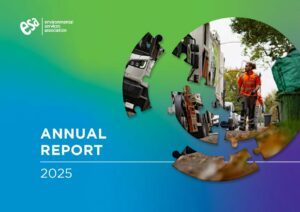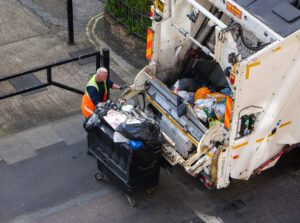By Jacob Hayler, Executive Director of the Environmental Services Association.
Falling immediately off the back of more palatable inflation figures, the Prime Minister’s snap General Election announcement sparked a flurry of legislative activity as Parliament attempts to wrap up unfinished business before it is dissolved next week.
At the time of writing, this began with the long-awaited consultation documents being published by DESNZ seeking stakeholder views on the expansion of the Emissions Trading Scheme to cover waste activities. This will have a profound effect on the complexion and cost of waste services, and is due to come into force just two short years from now, so we should be pleased that – with little other government business going on – our sector can spend the next two months formulating a response.
We were also expecting the results of the Defra study into Energy-from-Waste (EfW) capacity that reportedly prompted the recent ministerial direction to pause EfW permit applications – a direction due to expire next week that has left some projects in limbo. At the time of writing, it remains to be seen whether this will happen.
The imminent dissolution of Parliament earlier than most expected raises questions about the progress of other, Defra-led, announcements that risks a two-speed process between DESNZ and Defra if Government business grinds to a halt. Resources and waste policy must go hand-in-hand with the ETS to ensure it drives the right behaviour and doesn’t become an unavoidable cost.
Government’s plans for a landfill ban on biodegradable waste, as well as the outcome on its consultation on waste electrical reforms remain to be seen.
Fortunately, momentum has gathered over the past 12 months on the core Resources and Waste Strategy reforms – other than the Deposit Return Scheme, which has been delayed until 2027 – with statutory instruments already laid providing clarity over Extended Producer Responsibility (EPR) and reform of kerbside collection services. There is, however, still a lot of work to do prior to implementation and a lot of missing detail.
Our industry continues to yearn for investible policy conditions that will allow us to deliver the infrastructure and services needed to achieve national resource-efficiency and net-zero targets. After years of dither and delay, recycling rates have stagnated and the clock ticks on against the environmental targets to which the next Government will be bound.
On a more positive note, a General Election does offer the parties the chance to articulate their respective visions for the UK – perhaps resulting in renewed focus, commitment and delivery for areas of the economy and society deemed a priority by the victor.
Sadly, we cannot realistically expect recycling and waste treatment to be front and centre of any party’s manifesto in the context of myriad economic and societal challenges, but our industry has so much to offer the economy, society and the environment with the right policy drivers in place that it would be remiss of our sector not to make the case for some political support.
That is why, regardless of the election outcome, we believe it is essential that the new Government follows through on the Resources and Waste Strategy packaging reforms – now in their final stages – to create a stable climate for investment that will deliver thousands of green jobs, world-class infrastructure and a more circular, less wasteful lower-carbon economy.
In accordance with our national and sectoral net-zero carbon goals, we also believe the new Government must maintain momentum on including energy recovery in the Emissions Trading Scheme, accompanying it with a comprehensive landfill ban. Delaying these measures will hamper our ability to decarbonise the sector and play our substantial role in meeting national net-zero targets by 2050.
On the other side of the coin, the ETS should drive recycling performance – particularly for plastics – but increased recycling must be balanced with increased market demand for recycled material, which is why a long-term escalator on the rate and threshold for the plastic packaging tax should also be on future policy-makers’ to-do lists.
More broadly, investing in world-class recycling and waste treatment services and delivering on Government targets is being undermined by rampant criminality in our sector – with landfill tax fraud distorting the market and criminals operating with virtual impunity in front of an under-resourced regulator.
The Environment Agency is held back by a raft of financial and operational constraints that limit its effectiveness – which the new Government should address through scrutiny and reform, helping to protect not just the legitimate industry but our communities and natural environment. Much of the heavy-lifting on policy vital to our sector has been done by officials and stakeholders over the last few years and the wheels are finally now firmly in motion. We just need the next Government, regardless of its political colour, to take the driver’s seat, adjust the mirrors and ensure we do not now veer off course.
This op-ed was first published by www.letsrecycle.com on 23rd May 2024




